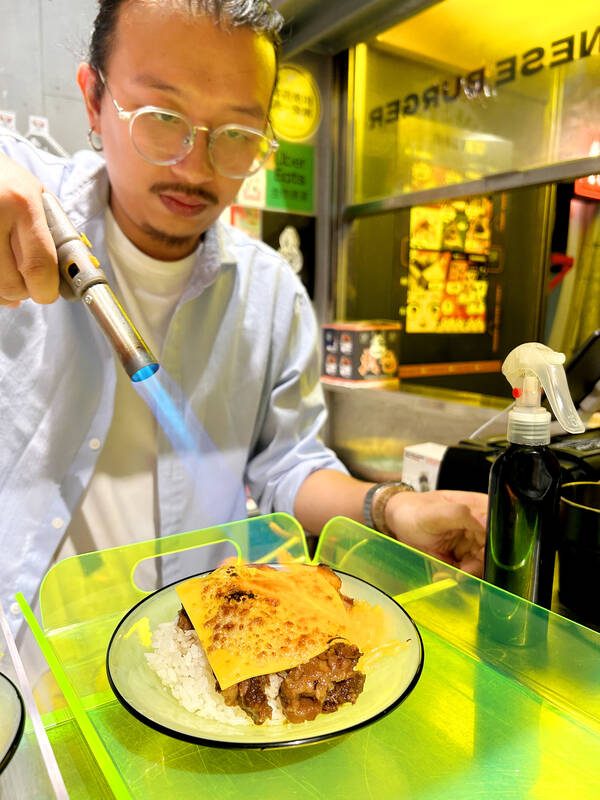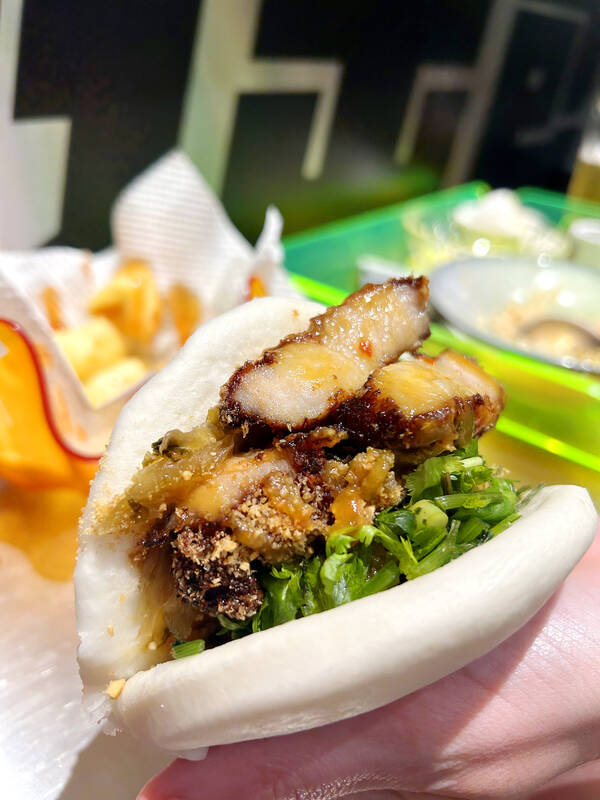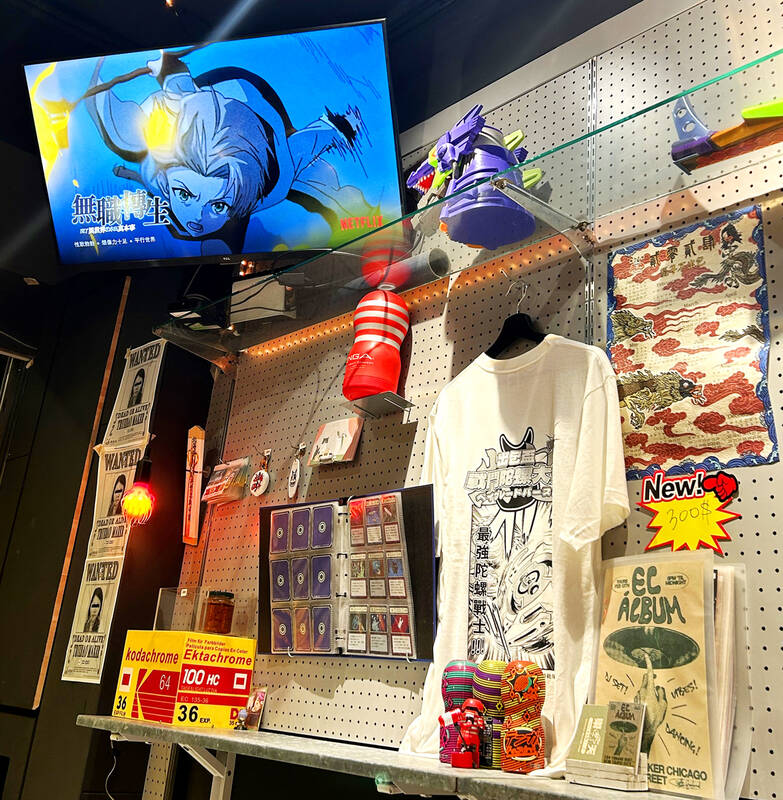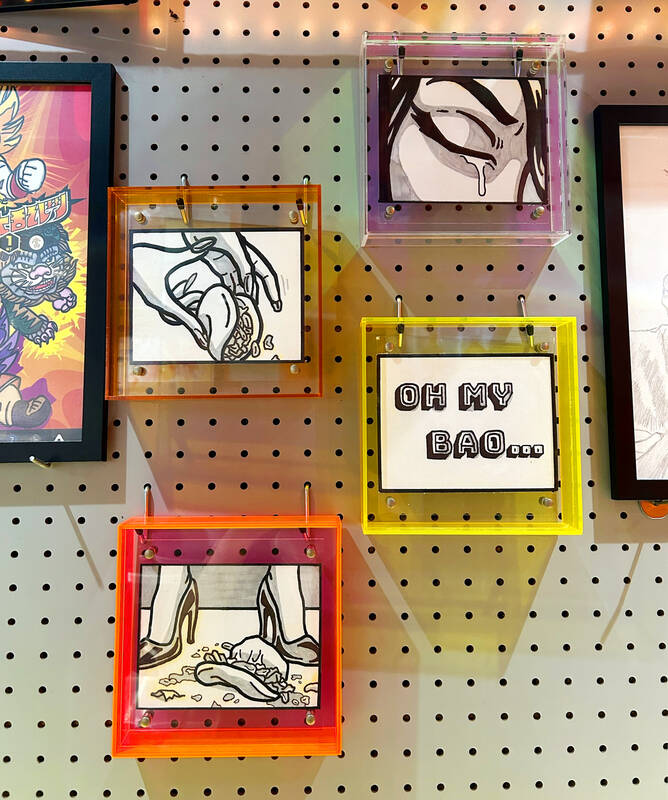Entering from a darkened alleyway, True Bao Maker (有情出包所) hits us with a blast of neon-bright pop-art posters and manga-packed shelves; speakers pump kitschy J-pop while the TV replays anime classics; zingy decor bursting with the Japanese cool of a backstreet Osaka hideout.
Owner Eric Weng (翁竹熲) welcomes us in with a smile and seats us on plastic stools at the open-top-bar, where we get acquainted with him and his childhood friend Alex Huang (黃國勳), a tattoo artist who designed the space using some of Weng’s wacky personal collection. But these guys aren’t just passionate about Japan, they’re dedicated to elevating a Taiwanese classic to a new dimension.
Gua bao (割包). Hailed as Taiwan’s “most world-famous street-food snack” by the Michelin Guide and coined the “Taiwanese hamburger,” this night-market staple features a pillowy bao bun stuffed with fatty pork belly, cilantro, pickled mustard greens and that signature dusting of finely ground peanut.

Photo: Hollie Younger
This delicacy, delicious as it is, requires an affinity for cilantro and gelatinous hunks of pork fat — a tricky feat for many foreigners, myself included.
Perhaps the bao buns we’re more accustomed to are the hybrid burger variety sweeping the Western world, stuffed with fried chicken, shredded duck, any beloved east-Asian culinary caricature. This is where funky fusion venue True Bao Maker fills Taipei’s gap in the market.
BURGERS, BUNS AND BEERS

Photo: Hollie Younger
Tonight was my second foray. I came across it by happenstance on a hungry evening around Chiang Kai Shek Memorial Hall, but a 4.9-star rating on Google reviews is never to be ignored.
First things first, we grab a cool draft pint of locally-brewed Taihu lager — do we want a sake bomb dropped in? Why not — and Weng translates us through the menu, bun by bun.
The cartoon pop-art menu offers four savory and two sweet bao burgers, including vegetarian offerings, sides of fries or fried pumpkin bites and a beef rice bowl, all available in good-value combo sets (NT$180+).

Photo: Hollie Younger
My recommendation is the meatball bao special (NT$150), a true east meets west concoction. Three crispy Italian-style meatballs of hearty ground beef, lashings of rich red wine sauce, American cheese and lettuce — fused with Asian flavors of cilantro, ground peanut, scrambled egg and that perfectly fluffy bao bun to hold it all together. This shouldn’t work, but it’s a fusion masterpiece.
The signature here is the spicy beef bao burger (NT$129); slow-cooked, melt-in-the-mouth with an explosive crimson red, house-made chili sauce. Unless you order medium, this will blow your head off, which is exactly what I was after.
The closest to its gua bao prototype would be the fried pork bao burger with orange sauce (NT$120). Forget Panda Express Orange chicken — we’re talking fresh, punchy citrus glaze that zaps through glistening slices of fried pork — still a gloriously fatty belly cut but with a modern upgrade. Anyone underwhelmed by a night-market bao bun, try this.

Photo: Hollie Younger
Weng says that the venture began as a food truck, and after almost two years of success on the road, they set up here in 2022. On weekdays, head for a solo lunch date perusing his extensive manga collection, but on Fridays, he says this place transforms into an open-door house party for friends and patrons to meet, greet and chow down.
After a double ordering of burgers, we pay a reasonably-priced bill and roll out feeling rather like overstuffed bao buns ourselves. “See you Friday!” Weng calls out. He just might.

In the March 9 edition of the Taipei Times a piece by Ninon Godefroy ran with the headine “The quiet, gentle rhythm of Taiwan.” It started with the line “Taiwan is a small, humble place. There is no Eiffel Tower, no pyramids — no singular attraction that draws the world’s attention.” I laughed out loud at that. This was out of no disrespect for the author or the piece, which made some interesting analogies and good points about how both Din Tai Fung’s and Taiwan Semiconductor Manufacturing Co’s (TSMC, 台積電) meticulous attention to detail and quality are not quite up to

April 21 to April 27 Hsieh Er’s (謝娥) political fortunes were rising fast after she got out of jail and joined the Chinese Nationalist Party (KMT) in December 1945. Not only did she hold key positions in various committees, she was elected the only woman on the Taipei City Council and headed to Nanjing in 1946 as the sole Taiwanese female representative to the National Constituent Assembly. With the support of first lady Soong May-ling (宋美齡), she started the Taipei Women’s Association and Taiwan Provincial Women’s Association, where she

Chinese Nationalist Party (KMT) Chairman Eric Chu (朱立倫) hatched a bold plan to charge forward and seize the initiative when he held a protest in front of the Taipei City Prosecutors’ Office. Though risky, because illegal, its success would help tackle at least six problems facing both himself and the KMT. What he did not see coming was Taipei Mayor Chiang Wan-an (將萬安) tripping him up out of the gate. In spite of Chu being the most consequential and successful KMT chairman since the early 2010s — arguably saving the party from financial ruin and restoring its electoral viability —

It is one of the more remarkable facts of Taiwan history that it was never occupied or claimed by any of the numerous kingdoms of southern China — Han or otherwise — that lay just across the water from it. None of their brilliant ministers ever discovered that Taiwan was a “core interest” of the state whose annexation was “inevitable.” As Paul Kua notes in an excellent monograph laying out how the Portuguese gave Taiwan the name “Formosa,” the first Europeans to express an interest in occupying Taiwan were the Spanish. Tonio Andrade in his seminal work, How Taiwan Became Chinese,